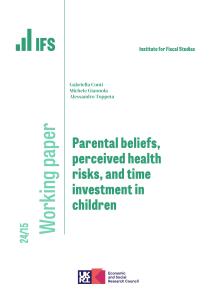Last year’s Budget announced several major changes to the way in which the government proposed to support childcare for working families. After considering the responses to the public consultation on these proposals, the Government has today announced more details on its new Tax Free Childcare scheme and the way in which childcare will be supported in Universal Credit.
The Tax-Free Childcare scheme, due to begin in autumn 2015, involves the Government topping up payments for childcare made by parents, in a way that is equivalent to parents’ spending on childcare being free of basic-rate income tax. At the same time, the existing scheme that allows employers to give childcare vouchers free from tax will be stopped for new claimants. The new Tax Free Childcare scheme will not be available to parents who receive tax credits or Universal Credit: they are instead able to receive childcare subsidies through the tax credit or UC system. Today’s announcement means that the planned system will be significantly more generous than initially envisaged, providing support to children up to 12 straight away, will provide a higher level of support, and will provide more generous support for childcare in Universal Credit. Yet the Treasury has not increased its estimate of the total cost, as it has revised down considerably its estimate of how many families will benefit.
Specifically, we learned several things today:
- Rather than being available initially only to children under 5 and then rolled out gradually to children under 12, the new Tax Free Childcare scheme will be available to children under 12 within its first year. The Government says an additional 0.7 million families will therefore benefit during the first year.
- Although the rate of subsidy remains at 20%, the maximum government subsidy payable for any one child will now be £2,000 a year, rather than £1,200, which will help those (currently relatively few) parents who spend more than £6,000 a year (just under £120 a week) per child on childcare.
- To be eligible for Tax Free Childcare, all parents in the family will need to earn at least £50 a week and less than £150,000 a year (with some exceptions where one adult is sick or disabled or on parental leave).
- All parents on Universal Credit will be entitled to an 85% subsidy on childcare spending. This is more generous compared to the announcement in Budget 2013, when the Government said that those paying income tax would receive an 85% subsidy and other claimants would receive a 70% subsidy. (This will be tapered away from better-off families in the same way as other elements of Universal Credit.)
- A new Early Years Pupil Premium will provide nurseries, schools and other providers of funded early education with extra money for disadvantaged three- or four-year olds
We also got a bit more information about the way that the Tax-Free Childcare scheme will work in practice and how it will interact with Universal Credit. On balance, today’s announcements suggest that the Government’s priority is to devise a scheme that is simple for parents to understand and access: they will not need to report changes in personal circumstances in real time, but only once a quarter, and they will not need to prove that they are in work, but instead only need to self-certify that they are earning more than £50 a week (with different rules applying to the self-employed). Broadly, this simplification is to be welcomed. But there are risks. In particular, policing the requirement to earn £50 a week will be difficult, as no income tax or NI is payable at (or anywhere near) that level of earnings. There will also be a very large incentive for some second earners to claim that they are earning that much: it could be worth thousands of pounds in childcare subsidy.
In what will clearly be an unwelcome decision for several companies which make money by administering the current employer childcare vouchers system, the Government has decided that the new Tax Free Childcare scheme will be delivered by HMRC in partnership with National Savings and Investments (NS&I), an Executive Agency of HM Treasury. Here, the Government has decided that simplicity to parents and the economies of scale that arise from having just one provider are more important than any benefits that would have arisen from having several companies compete to administer the accounts. It has also announced that parents will not need to pay fees to access the scheme.
Surprisingly, today’s announcements come with no new money. Extending the new Tax Free Childcare scheme to all children under 12 within its first year will cost money compared with a world where it was limited to children under 5, but the Treasury can make this announcement without altering its public spending plans because it has significantly revised down its estimate of how many families are likely to be eligible for the scheme (from 2.5 million to 1.9 million). It is not clear what has led to this dramatic change, and so we cannot judge whether these new estimates are any more plausible than the initial ones, but the fact that the change is so large suggests that the Treasury would benefit from being more open about the way it costs new policies. The increased generosity of support for childcare under Universal Credit will be matched by savings elsewhere in Universal Credit that will be confirmed in the autumn.
These announcements confirm that childcare is likely to be an important political battlefield in the months leading up to the general election. In this context, it is crucial that the Government and the opposition parties are clear about the objectives and evidence underlying their proposals. Today’s announcements indicate that the Government’s main motive is to help parents move into work. As we pointed out in the IFS 2014 Green Budget, we know remarkably little about the impact of the policies to support childcare that have been introduced in England in recent years. And there is no consistent evidence from other countries that childcare support has large effects on parental labour supply. While today’s announcements bring welcome simplifications to the new Tax-Free Childcare scheme, and an increase in generosity that will certainly be welcomed by families on Universal Credit using childcare, and better-off families who spend more than £6,000 a year on childcare, the extent to which it will deliver its intended goals is essentially unknown.










